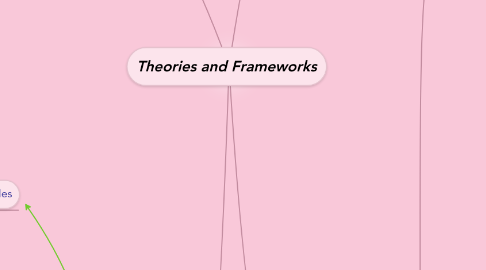
1. Media Ecology: basic principles
1.1. -the study of media environments
1.2. -it is the idea that technology, modes of information and codes of communication play a leading role in human affairs
1.3. -Nystrom defines it as "the study of complex communication systems as environments"
1.4. Media ecologists are interested in the interactions of communications media, technology,technique and processes with human feeling, thought, value, and behaviour
1.5. Media ecology is a preparadigmatic science
1.6. Implications on education:
1.6.1. Since technology plays a leading role in our affairs we need to utilize technology in the classroom whenever possible
1.6.2. technology such as iPads have so much to teach students and students have a great time using them so we need to utilize these as much as possible
1.6.3. We need to make sure we're preparing our students to be technologically savvy once they're in the work place
2. Technological Theories
2.1. Social Construction of Technology
2.1.1. technology does not determine human action but human action determines technology
2.1.2. -the ways a technology is used cannot be understood without understanding how that technology is embedded in its social context
2.1.3. SCOT is a response to technological determinism
2.1.4. those who seek to understand the reasons for acceptance or rejection of a technology should look to the social world
2.1.5. Implications for education:
2.1.5.1. -students can come to learn that basically everything around us is socially constructed
2.1.5.2. -students can begin to analyze why certain technologies are considered "the best" and if it is certain groups that create these statements
3. TPACK
3.1. stands for technological, pedagogical, content, knowledge, and can be viewed as a venn diagram as shown in this link
3.2. TPACK attempts to identify the nature of knowledge required by teachers for technology integration in their teaching, while addressing the complex, multifaceted and situated nature of teacher knowledge
3.3. -originated from PCK from Shulman who first said that pedagogical knowledge and content are not mutually exclusive
3.4. -TPACK can be broken down into dimensions such as TK (technological knowledge- which is knowledge of the different types of technology tools that can be integrated into teaching
3.5. TCK (technological content knowledge) - knowledge of how technology can be used to teach content in new ways
3.6. TPK ( technological pedagogical knowledge) - what technology can and can't do as an enabler of different teaching approaches
4. Learning Theories
4.1. Connectivism
4.1.1. -learning has an end goal, the increased ability to "do something"
4.1.2. -integration of cognition and emotion in meaning making is essential
4.1.3. -learning is a process of connecting specialized nodes or information sources
4.1.4. learning may reside in non-human appliances
4.1.5. learning and knowledge rest in diversity of opinions
4.1.6. up to date knowledge is the intent of all connectivist learning
4.1.7. different approaches and personal skills are needed to learn effectively in today's society.
4.1.8. capacity to know more is critical than what is currently known
4.1.9. Implications for Education:
4.1.9.1. -since technology is altering (rewiring) our brains, and the tools we use are defining and shaping our thinking, we need to make sure that as teachers we are cautions of the technology we are introducing to our students
4.2. Cognitive Load Theory: basic principles
4.2.1. is an information processing theory
4.2.2. it's used to explain the limits of working memory based on current knowledge of human cognitive architecture
4.2.3. working memory can only handle 7 disconnected items at once
4.2.4. overload occurs when working memory has to process too much too fast
4.2.5. long term memory is virtually unlimited and assists working memory
4.2.6. schemas are memory structures written in long term memory by working me memory
4.2.7. working memory is overloaded when its ability to build a schema is compromised
4.2.8. Implications for education
4.2.8.1. we need to make sure we don't overload our student's brains by making them memorize to much information too fast
4.2.8.2. we shouldn't teach students more than 7 disconnected items at once
4.3. Constructivist Theory
4.3.1. is about how people learn
4.3.2. people construct their own understanding and knowledge of the world through experiencing things and reflecting on those experiences.
4.3.3. When we encounter something new, we have to reconcile it with our previous ideas and experience
4.3.4. we are active creators of our own knowledge
4.3.5. Implications for education:
4.3.5.1. we need to encourage students to use active techniques (experiments, real-world problem solving) to create more knowledge and then to reflect on and talk about what they are doing and how their understanding is changing
4.3.5.2. Constructivist teachers encourage students to constantly assess how the activity is helping them gain understanding
4.4. Behaviourism: basic principles
4.4.1. can be traced back to Aristotle
4.4.2. Watson is the theorist that coined the term 'behaviorism"
4.4.3. learning as a complex process of responses to several kinds of distinct stimuli
4.4.4. behaviorists are concerned with actions (behavior) as the sites of knowing, teaching, and learning
4.4.5. Behavior can be shaped using positive reinforcement, negative reinforcement, punishment or rewards
4.4.6. free will is an illusion and all behavior is determined by a combination of forces
4.4.7. Implications for Education:
4.4.7.1. positive reinforcement can be used to increase the likelihood that a desired response or action will occur again
4.4.7.2. negative reinforcement can also be used in a classroom to increase the probability of a desired response
4.4.7.3. Extinction is commonly used in classroom when a teacher ignores a behavior that she wants extinguished. ex- when I ignore the student who is constantly calling out the hope is that he will eventually stop because he realizes that he's not getting any reaction
